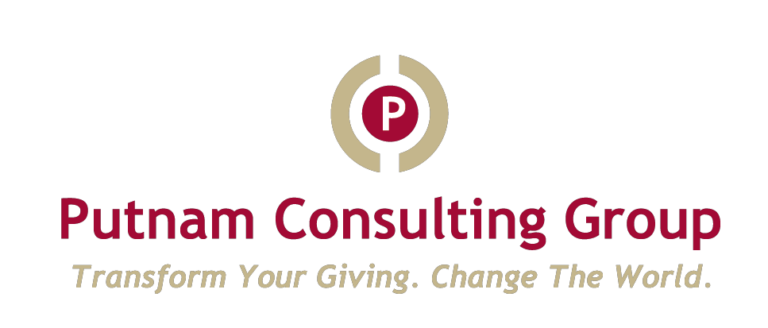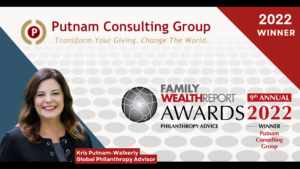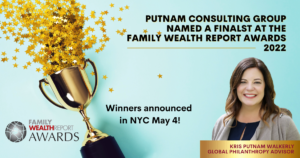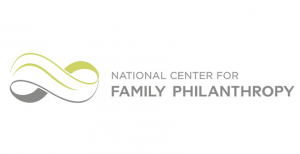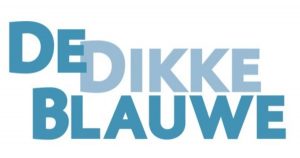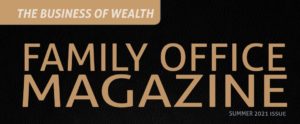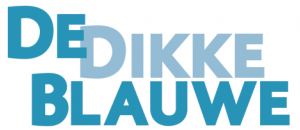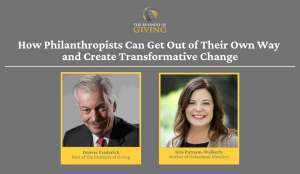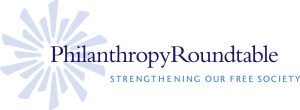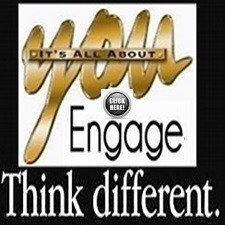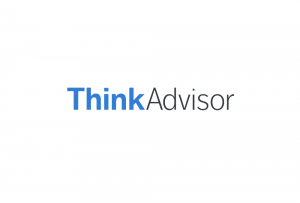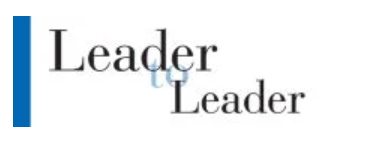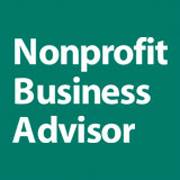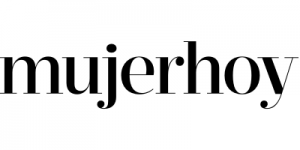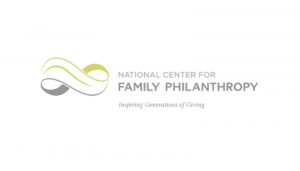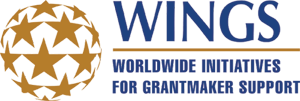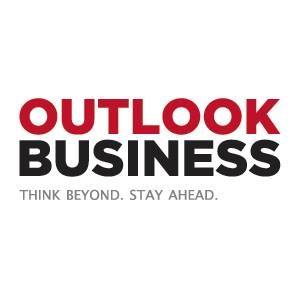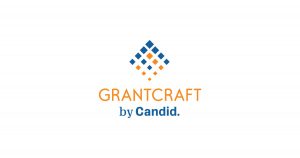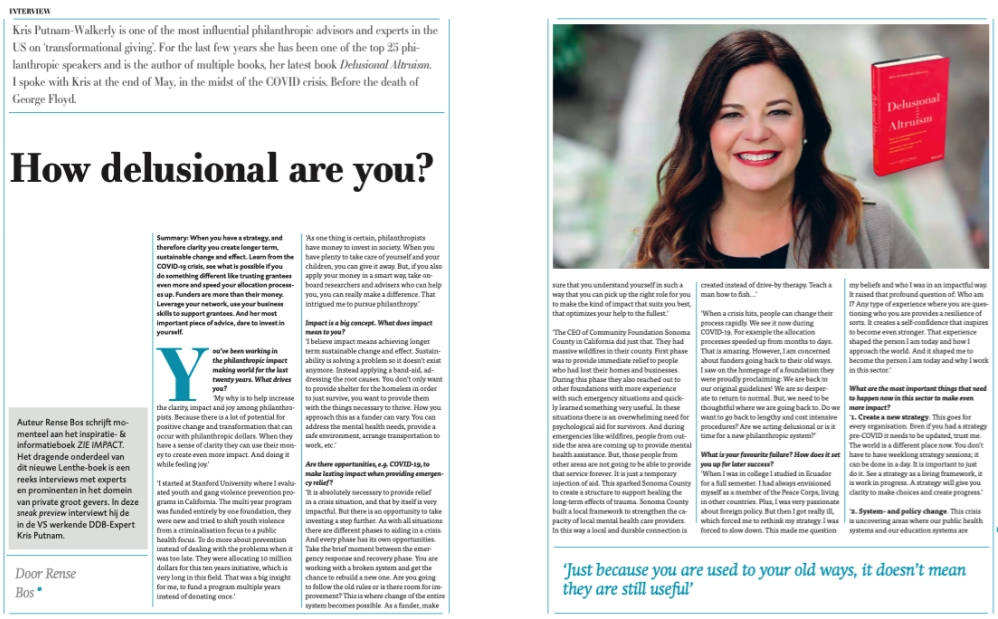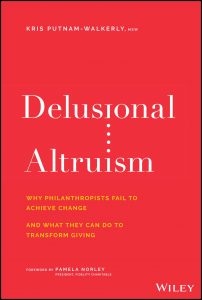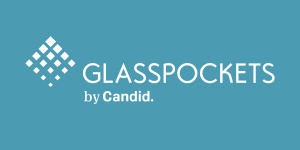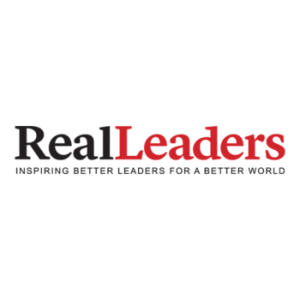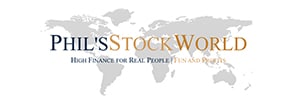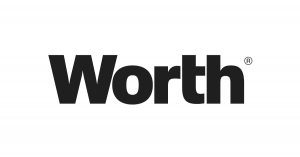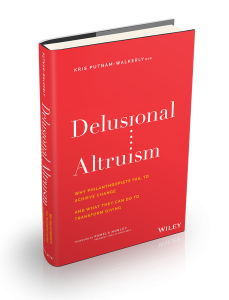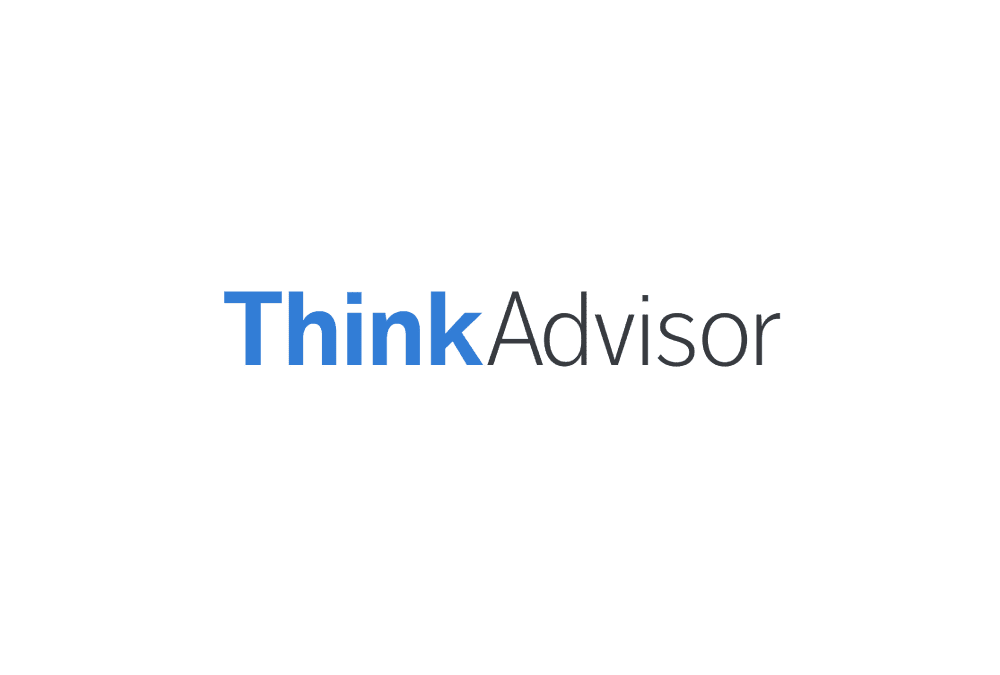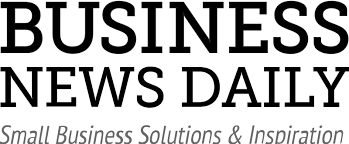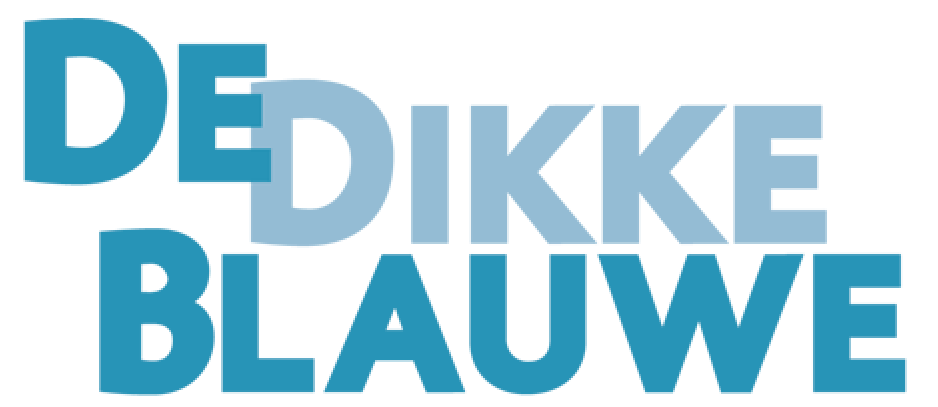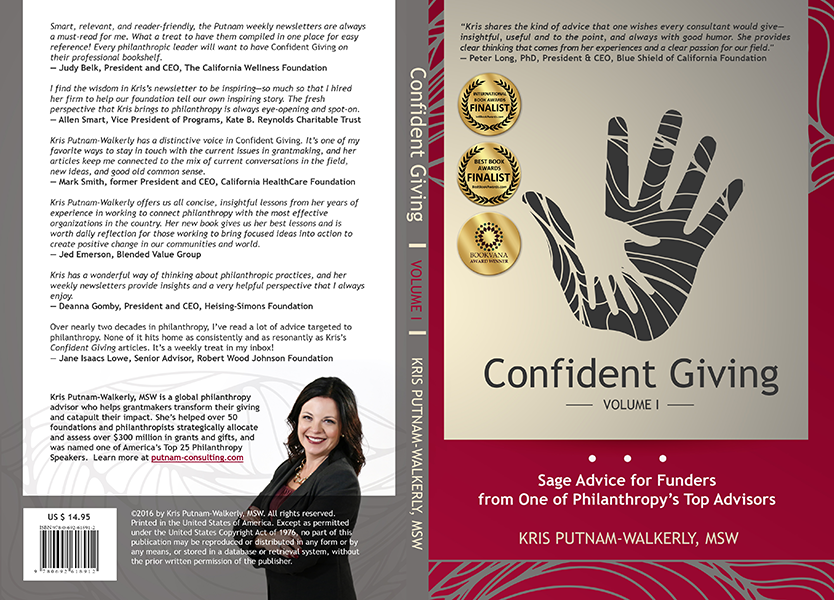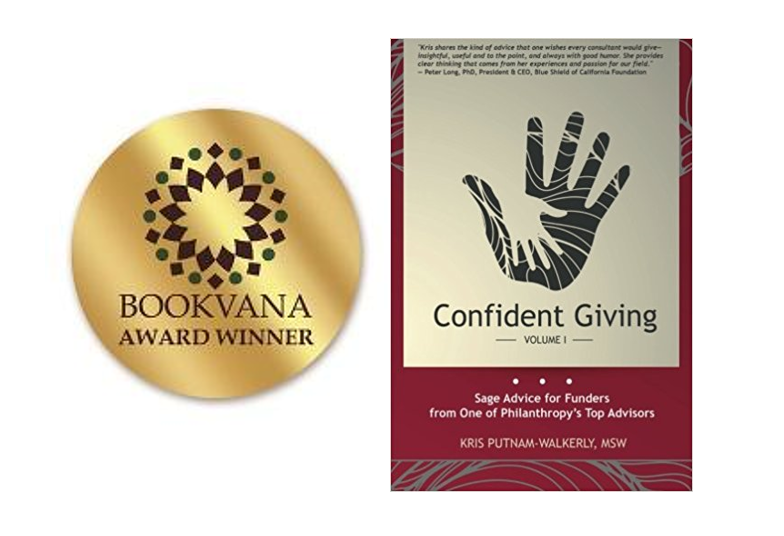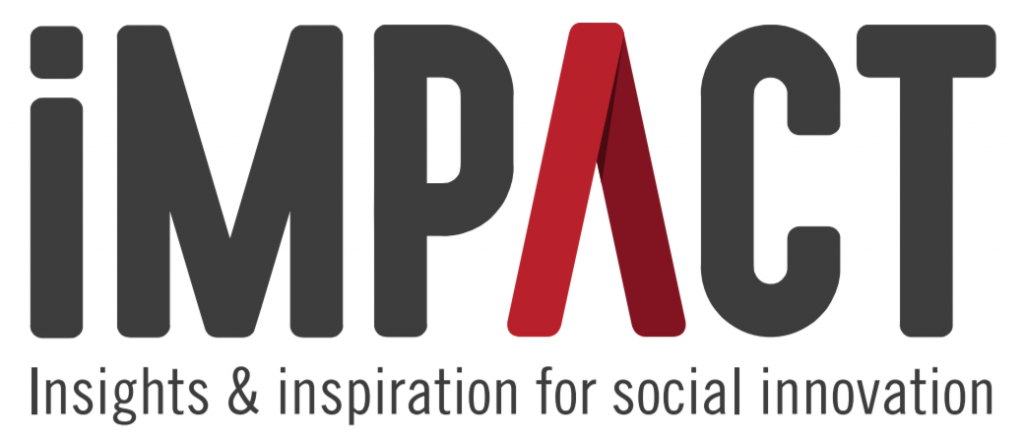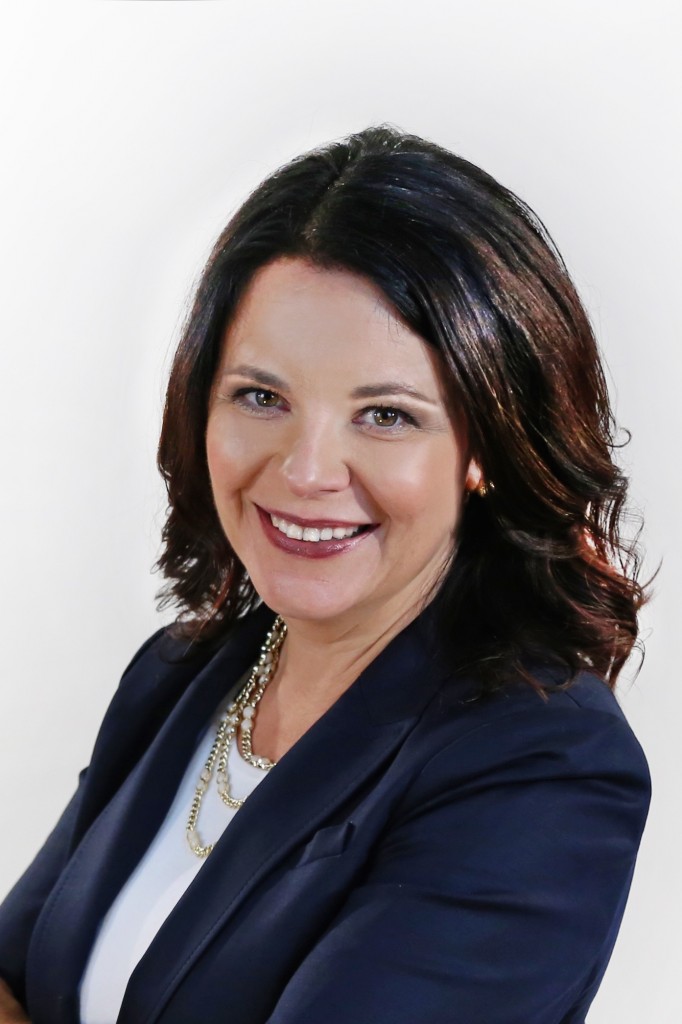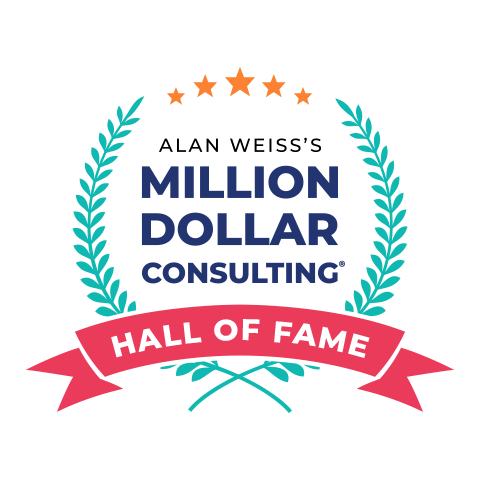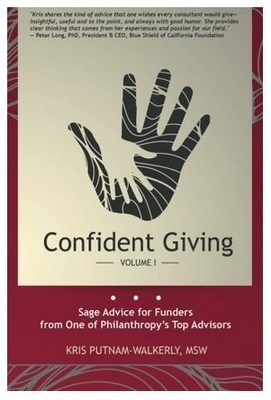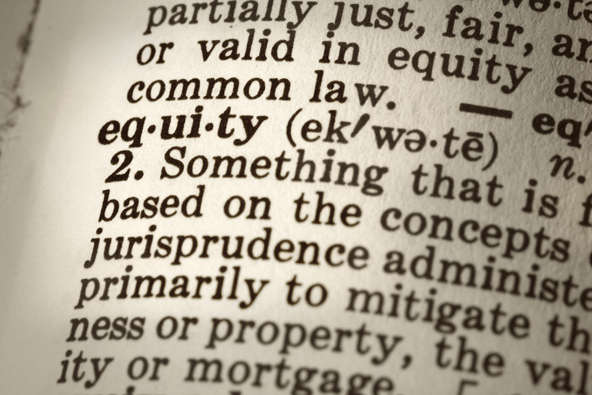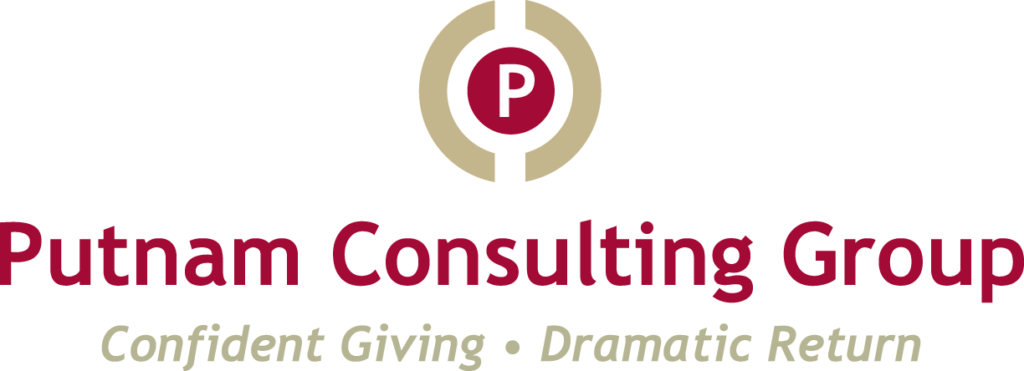In The News
Philanthropy expert Kris Putnam-Walkerly is regularly quoted in national and industry publications.
April 15, 2024
The Putnam Consulting Group, led by Kris Putnam-Walkerly, is a finalist in the Philanthropy Advice category for the 11th Annual Family Wealth Report Awards, marking the third consecutive year of recognition. Winners will be announced on May 2, 2024, in New York City.
May 1, 2023
The 10th Annual Family Wealth Report Awards recognize the most innovative and exceptional firms, teams and individuals serving the family office, family wealth and trusted advisor communities in North America. Putnam-Walkerly expressed her delight at being named a finalist for the second year, stating, “It is a great honor to be recognized in the shortlist of finalists, which is a testament to the quality of philanthropic advice we provide to affluent families, family offices, and family foundations.”
August 5, 2022
“Develop an ongoing relationship with the charities you support,” said Kris Putnam-Walkerly, president of Putnam Consulting Group, a philanthropic advisory firm. “Don’t limit giving to the end of the year. Talk to the nonprofit about ways you could help year-round, such as volunteering, sponsoring events and inviting the charity’s CEO to speak to your local business associations. And remember, this is a two-way relationship. Ask the charity if there are easy ways they could publicize your support, such as in their donor newsletters.”
May 17, 2022
CLEVELAND, May 17, 2022 — Putnam Consulting Group, one of the industry leaders, has been handed the honor of winning the ‘Philanthropy Advice’ award in the 9th Annual Family Wealth Report Awards 2022 Program.
February 16, 2022
CLEVELAND, February 16, 2022 –– Putnam Consulting Group, a global Putnam Consulting Group, a global consultancy led by philanthropy expert Kris Putnam-Walkerly, was selected as a finalist in the Philanthropy Advice category at the Family Wealth Report Awards 2022 Program. Winners will be announced on May 4, 2022, at the Gala Ceremony at the Mandarin Oriental Hotel in Manhattan, New York.
October 11, 2021
We often think of a good leader as someone who goes first. A person who wouldn’t ask her team to do anything she wouldn’t do. But what happens when the one out in front doesn’t have the crucial information to make good decisions? What if that information instead resides with the people around her?
October 11, 2021
We often think of a good leader as someone who goes first. A person who wouldn’t ask her team to do anything she wouldn’t do. But what happens when the one out in front doesn’t have the crucial information to make good decisions? What if that information instead resides with the people around her?
October 9, 2021
“She’s been very front and center about the importance of advancing equity, and also intentionally funding organizations led by people of color, led by women, led by LGBTQ people,” says Kris Putnam-Walkerly, the author of Delusional Altruism and founder of Putnam Consulting Group, which advises billionaire donors, corporations and community foundations alike on their giving strategies.
October 9, 2021
“She’s been very front and center about the importance of advancing equity, and also intentionally funding organizations led by people of color, led by women, led by LGBTQ people,” says Kris Putnam-Walkerly, the author of Delusional Altruism and founder of Putnam Consulting Group, which advises billionaire donors, corporations and community foundations alike on their giving strategies.
September 9, 2021
DDB Expert Kris Putnam calculates that – minus public holidays and days off – there are still about 67 working days to go until the end of this year. 67 days left to reach those end goals you set at the start of this year. Panic? Not if you follow these six steps from Kris Putnam!
August 10, 2021
Philanthropy consultant Kris Putnam-Walkerly says she likes using the app to organize panel-like discussions about fundraising and giving practices.
August 5, 2021
Nearly everything but its title suggests Delusional Altruism is about the transformative role effective grant-making can play in community life. Kris Putnam-Walkerly’s book is partly a study of what happens when the best altruistic impulse gets mired in unintended consequences. Yet mostly it’s a study in recognizing delusion’s clever disguises, especially within the confines of institutional philanthropy, and offers dozens of strategies to turn good intentions into equitable and meaningful impacts.
Summer 2021 Edition
Philanthropy is the secret to winning new business and retaining clients across generations. It provides a platform for your family office to expand your expertise and services, establish and deepen relationships, and grow your business.
May 16, 2021
Build trusting relationships before times get tough. Regardless of who you’re trying to help or who your potential collaborators are, we’re all human and we need to know that we can count on people to show up and do what they say they’re going to do. In times of difficulty, relationships get tested, stress levels rise, and resources become taxed. But if you’ve spent the days, months and years leading up to this moment being a solid and reliable presence and good philanthropic partner, then you’ll be a leader people trust. And you’ll also have no shortage of allies at the ready to support you in return, making the act its own reward.
May 1, 2021
Despite big and positive changes in grant-making practices during a year of pandemic-induced pressures on nonprofits and a nationwide reckoning over racial injustice, foundations need to guard against slipping back to their old ways. Many foundations remain stuck in a mindset that philanthropy adviser and author Kris Putnam-Walkerly calls “delusional altruism,” a tendency toward illogical behavior that undermines progress. The phenomenon manifests itself in “a fixation on saving money, a belief that moving too quickly could send them down the wrong path, and a fear of losing control.”
April 26, 2021
Grantmakers faced their fears and overcame harmful giving patterns during a year of extreme challenges. They need to embrace their newfound bravery permanently.
April 16, 2021
The title caught my eye, and I immediately clicked “Add To Cart” and bought Delusional Altruism. In two words, Kris Putnam-Walkerly sums up one of my niggling worries about the grants that I’m involved with. Giving makes us feel good, but we’re deluded. There’s a sincere desire to respond to the needs of society, vast sums of money are granted, but in the end we find our interventions aren’t making a dent on the need. Are we just fooling ourselves that philanthropy is “changing the world”?
April 13, 2021
Internationale filantropieadviseur en DDB-expert Kris Putnam ‘viel bijna van haar stoel’ toen ze hoorde dat haar bedrijf door LUXlife Magazine is uitgeroepen tot filantropieadviseur van het jaar als onderdeel van de 2020 Global Excellence Awards.
April 9, 2021
If you want your philanthropy to help change the world, you might need to change how your funding is structured. In addition to disrupting longstanding power dynamics between grantor and grantee, the way you structure your funding should align with the type of impact you wish to see. Here are five different approaches to funding that will help you—-and your partners—-increase your impact velocity.
March 24, 2021
BURTON-ON-TRENT, United Kingdom and CLEVELAND, March 24, 2021 /PRNewswire/ — Putnam Consulting Group, a global consultancy led by philanthropy expert Kris Putnam-Walkerly, was named Philanthropy Advisor of the Year by LUXlife Magazine’s 2020 Global Excellence Awards. LUXlife Magazine is a premium lifestyle publication that focuses on a range of topics within the luxury lifestyle industry. Winners of the 2020 Global Excellence Awards were selected for their successes, achievements and growth, despite the crippling nature of the global pandemic.
March 23, 2021
The world has a lot of philanthropists. Delusional Altruism is for all of them—but especially for those who aren’t quite achieving the impact they seek. They come in many forms: ultra-high-net-worth donors, wealthy families, foundations, Fortune 500 companies, donor-advised funds, celebrity activists, professional athletes, family offices, giving circles—individuals and organizations large and small.
March 9, 2021
Met COVID-19 is het maatschappelijk middenveld een nieuw tijdperk binnengetreden. Niets is meer zoals het was, en geen twee non-profit situaties zijn hetzelfde. Sommige organisaties hebben hun inkomsten drastisch verhoogd en nemen mensen aan, terwijl andere programma’s stopzetten en personeel ontslaan. Internationale filantropie-expert en adviseur Kris Putnam-Walkerly noemt drie belangrijke handelswijzen die je direct in de praktijk kunt brengen om je organisatie te helpen sterker dan ooit uit deze crisis te komen.
March 3, 2021
Many of the assumptions and norms we have relied on have been challenged significantly over the past year. Philanthropy and the way giving is done is no exception. As new practices are being established, I thought it would be important to hear from an expert in the field who can tell us what’s emerging and how philanthropy is likely to change in the years ahead. She is Kris Putnam-Walkerly, the author of Delusional Altruism: Why Philanthropists Fail to Achieve Change and What They Can Do to Transform Giving.
March 2, 2021
On February 25, I (Joanne Florino) attended a webinar titled “Generation Impact: How Next Gen Donors Are Revolutionizing Giving.” Hosted by philanthropy advisor Kris Putnam-Walkerly, the presentation featured 21/64 Founder and Vice President Sharna Goldseker, nonprofit consultants to multigenerational families, and Michael Moody, the Frey Foundation Chair for Family Philanthropy at the Dorothy A. Johnson Center for Philanthropy at Grand Valley State University. The webinar was based on the book Generation Impact, which Goldseker and Moody had co-authored in 2017 and then updated and expanded in 2020.
March 1, 2021
Think feeling overwhelmed is not a big deal for philanthropists? Think again. In addition to zapping our creativity and problem-solving skills, overwhelm creates a relentless cycle of inactivity. We stop in our tracks. We don’t know the right path forward, which step to take, or what direction to choose. Overwhelm costs money, drains time, and suffocates talent.
Here are four ways philanthropists experience overwhelm and what to do instead.
February 25, 2021
At a time of deep social anxiety as we grapple with a pandemic, police brutality, and systemic racial inequalities brought into even starker relief because of COVID-19, we need to be honest with ourselves about exactly where and how we are falling short.
February 12, 2021
“Simplify the complex, don’t complexify the simple.” I recently heard the author of Delusional Altruism and nonprofit consultant Kris Putnam-Walkerly utter that phrase during a presentation at the Florida Philanthropic Network (FPN) Virtual Summit. It blew my mind. We often talk about the need to simplify things—our processes, strategies, relationships, our lives in general—but it had never been so clear for me than in that moment just how prone we can be to doing the opposite. To “complexify” things with the best of intentions, though often with unintended results.
February 1, 2021
In the article What Does ‘Equity’ Mean? by Kris Putnam-Walkerly & Elizabeth Russell write: The term ‘equity’ is spreading like wildfire in some philanthropic circles. It is showing up more and more in organizations’ mission and values statements. It’s making its way into the titles of conferences, plenary and breakout sessions, and meetings at the national, state, and local levels.
January 8, 2021
Kris Putnam-Walkerly provides five ways for philanthropists to support nonprofit leaders working on the frontlines, offering aid to communities impacted by COVID-19.
January 1, 2021
Nonprofit leaders are exhausted. Many were planning to leave even before 2020 happened. There were the white boomers trying to retire, the young leaders of color trying to navigate cultures not ready to put them in power, and the many in between ready to cry uncle because of the never-ending steep uphill climb.
December 18, 2020
If you want your philanthropy to help change the world, you might need to change how your funding is structured. In addition to disrupting longstanding power dynamics between grantor and grantee, the way you structure your funding should align with the type of impact you wish to see.
December 18, 2020
Kris Putnam-Walkerly is listed as #30 on the list. Check her out and other great influencers here.
December 9, 2020
This season we’re examining the challenge facing the nonprofit workforce. In Episode 9, we explore the scarcity mind-set inside organized philanthropy itself as a major source of the deficit of investment in the nonprofit workforce. We sit down with Kris Putnam-Walkerly, a long-standing consultant to the funding community (and a past consultant to Fund the People), Kris’s new book, Delusional Altruism, forcefully articulates a litany of self-defeating funder behaviors and attitudes.
December 7, 2020
Kris Putnam-Walkerly shares four approaches that organizations and individuals that have already spent their philanthropic allocation for the year can employ to support nonprofits.
December 7, 2020
Nonprofit leaders are exhausted. Indeed, many were planning to leave their jobs even before 2020 happened. They include white boomers looking to retire, young leaders of color trying to navigate cultures not ready to accept them in positions of power, and the many in between ready to cry uncle because of the neverending uphill climb they face.
November 25, 2020
During COVID-19, the world is watching and experiencing how systemic racism and injustice magnifies personal hardship and undermines recovery. At the same time, more and more people wonder how they can change the ugly and relentless reality of institutionalized racism and oppression and create a more just world. While we all have a role to play, advisors find ourselves in a unique position. Often, we serve as truth-tellers, helping people and institutions expand their comfort zone.

November 23, 2020
This year, there’s so much on the table in terms of end-of-the-year giving. The challenge can be how to focus, and how to act. While established foundations likely have a grant-making schedule in place, less structured family philanthropies or individual philanthropists may be facing the challenge of last-minute decision-making: when to give and what to give.
*Find Kris on page 14
November 19, 2020
This year, there’s so much on the table in terms of end-of-the-year giving. The challenge can be how to focus, and how to act. While established foundations likely have a grant-making schedule in place, less structured family philanthropies or individual philanthropists may be facing the challenge of last-minute decision-making: when to give and what to give.
November 3, 2020
Now, many funders finding themselves in an awkward situation. They’ve intentionally allocated all or most of their annual grant budget to meet pressing needs like saving lives, preventing economic devastation, and creating systems change. But they still have many months left in their fiscal year. Their primary tool – grant funding – is gone.
What to do? The good news is there are many things you can still do to help nonprofits. And you probably have more time to do them, now that you won’t be spending it preparing grant summaries and board dockets. So, follow the 2020, “I Have No More Grant Budget” Playbook.
November 3, 2020
No doubt as a wealth advisor, you know that over the next 25 years, nearly 45 million U.S. households will transfer over $68 trillion in assets to heirs and charity. And you realize that this wealth transfer isn’t just happening in the United States; it’s happening around the world. India (home to 119 billionaires) will experience a $128 billion intergenerational wealth transfer over the next decade alone. Here are five of the most common traps you can help your clients avoid.
October 13, 2020
The author stresses the need for leaders to have an abundance mindset in creating change, particularly in roles of philanthropy. The article begins with three examples of social entrepreneurs adopting an abundance mindset: The Kenya Community Development Foundation, Social Venture Partners India, and The William and Flora Hewlett Foundation. Eight behaviors that lead with abundance are you are proactively generous; you have the courage to grow and develop yourself continuously; you are resilient; you embrace inclusion; you believe you deserve the best; you think big; you take prudent risks; and you invest in your capacity and talent, and that of your partners. Within the section on investing in yourself, four areas are explored: capacity, talent, technology, and learning. Within investing in your partners, the areas are take time to build trusting relationships; stick with partners though challenging times; make sufficient investments in infrastructure, organizational capacity, and long‐term planning; and support the competition. When you or the people around you have an abundance mindset, you’ll routinely hear questions like Who are the top experts in the country (or world) who can advise us? Who are the best people we can get and what is the most strategic use of their time?
October 2020
Nonprofit leaders are exhausted. Many were plan- ning to leave even before the start of 2020. There were the white boomers trying to retire, the young leaders of color trying to navigate cultures not ready to put them in power, and the many in-between “ready to cry uncle” because of the never-ending steep uphill climb. These are the people on the front lines of your mission, people who philanthropy and society needs. So, in addition to providing emergency COVID funding and supporting longer-term recovery, what can you do to support the people we desperately need to lead this work, so that they ascend, stay and thrive? Here are five ways—none of which leads with spending money.
October 2020
An intentional approach to giving can help seed and deepen Colombia’s culture of giving and the philanthropy sector’s ability to make a meaningful change now and into the future. Kris shares practical advice to help Colombian Foundations increase their philanthropic effectiveness.
*Please note: This PDF is in Spanish. Find Kris’s article in English on page 15.
October 21, 2020
Kris Putnam-Walkerly’s Delusional Altruism (Wiley, 2020) has advice on how philanthropists can do better.
October 20, 2020
It may seem logical to let philanthropic endeavors play out at their own pace, with those involved waiting around to see what happens rather than spurring the next steps. That said, like simplification, this approach is only constructive in moderation. Philanthropists should be prepared in advance, but they also need to act quickly to avoid missing additional opportunities to help; they can always hone and adapt their strategy along the way. This prioritization approach may seem harrowing at first, but, as Kris Putnam-Walkerly observes, it has become vital in a COVID-altered world demanding rapid adaptation and fluidity.
October 13, 2020
The author stresses the need for leaders to have an abundance mindset in creating change, particularly in roles of philanthropy. The article begins with three examples of social entrepreneurs adopting an abundance mindset: The Kenya Community Development Foundation, Social Venture Partners India, and The William and Flora Hewlett Foundation. Eight behaviors that lead with abundance are you are proactively generous; you have the courage to grow and develop yourself continuously; you are resilient; you embrace inclusion; you believe you deserve the best; you think big; you take prudent risks; and you invest in your capacity and talent, and that of your partners. Within the section on investing in yourself, four areas are explored: capacity, talent, technology, and learning. Within investing in your partners, the areas are take time to build trusting relationships; stick with partners though challenging times; make sufficient investments in infrastructure, organizational capacity, and long‐term planning; and support the competition. When you or the people around you have an abundance mindset, you’ll routinely hear questions like Who are the top experts in the country (or world) who can advise us? Who are the best people we can get and what is the most strategic use of their time?
September 2020
There has never been a time when we need more clarity of purpose than now. But as a global philanthropy advisor, I often see the same critical mistakes made in terms of approach and impact. So here are five common myths about philanthropy that tend to take our giving efforts in the wrong direction—and five actions to overcover them and transform your giving.
September 6, 2020
Un año después de divorciarse del fundador de Amazon, ha escalado en los ranking de los milmillonarios hasta convertirse en la segunda mujer más rica y la decimotercera fortuna del planeta. Pero tiene grandes planes para gastar su patrimonio. Para empezar, se ha comprometido a donar la mitad y está aprendiendo de la mejor, Melinda Gates. Con su ayuda, ha empezado a sacar millones de su cuenta corriente.
September 2, 2020
Feeling uncomfortable? You’re not alone. We’re all being asked to stretch and grow these days as we navigate a new world. Along with COVID-19, we’re facing divisive political rhetoric, and the growing needs of a struggling civic society. Add to that the challenges of a recession and a deafening cry for action to condemn racism and increase social justice. While many family philanthropists navigate these challenges and opportunities, many more are also stepping in for the first time to contribute time, talent and resources. Rest assured that nobody has faced anything like this before. Feeling out of your element comes with the territory.
August 26, 2020
Civil society membership associations were made for times like these. Shining bright these past six months, they’ve heroically grabbed their members’ hands and illuminated pathways forward. They’ve helped members navigate the pandemic and prepare for recovery, offering real-time learning, sharing best practices, creating rapid-response funds, soliciting critical information through surveys, supporting collaboration across government and business, and encouraging funding for racial justice.
August 26, 2020
Don’t let misguided thinking prevent you from creating change. As philanthropists seek to change the world, many need to get out of their own way. By that I mean that, too often, philanthropists see the change they want to create but prevent themselves from acting on it. And what’s worse, most don’t even realize they’re doing this.
August 26, 2020
If you want to make a difference in society, don’t let delusional altruism hold you back. In an Outlook Business interview, Putnam says that non-profit organizations and their funders need to set goals, strategize and allocate resources to the cause as if they were running a corporate for-profit organization.
August 26, 2020
During COVID-19, we’ve seen how systemic racism and injustice magnifies personal hardship and undermines recovery. We’re also witnessing what happens when too many nonprofit organizations balance on a financial knife’s edge. So, just when we need robust social safety nets, civil society is at its weakest. Hard on the heels of that massive need, we’re experiencing an even more deafening call to action to condemn business as usual and dismantle racism in this country.
August 19, 2020
Wondering how you can make a bigger difference in the world and gain a new generation of clients? Help your clients become more effective philanthropists. With the upcoming $68 trillion that will be transferred to heirs and charity in the next 25 years, and a growing list of social challenges to solve, it’s a perfect time to take your support of socially-minded clients and their heirs to a new level.
August 15, 2020
In the United States of America in 2020, the sickening murder of a black man at the hands of the police is not new. For the world of philanthropy, it makes the pandemic look like a dress rehearsal for the main event. The message resonating to me most right now is that everyone—and especially people with privilege and power in government, philanthropy and corporate America—is in a position to condemn business as usual. So, in the spirit of condemning business as usual, how does philanthropy reach its full potential to help catalyze, support and sustain this work? It must stop all privileged practices that get in the way. By recognizing and abolishing tightly-held beliefs and misguided practices, the sector will position itself to do the hard work ahead.
August 13, 2020
Philanthropy: This is your moment. Businesses are facing bankruptcies and mass layoffs, with small businesses hit hardest of all. Widespread closures of nonprofits will be no different, according to industry experts. Nonprofits employ 10% of the nation’s private-sector employment, according to the Bureau of Labor Statistics, and provide the key services and supports that communities depend on, from education to mental health to arts & culture and beyond.
August 11, 2020
On July 28, MacKenzie Scott surprised the world by announcing she had made $1.7 billion in donations to 116 nonprofit organizations. They were selected for the transformative work they were doing and to support leaders driving change in a variety of issues. Scott is the richest woman in America, with a net worth of about $62 billion. Her donations are noteworthy for many reasons, including that about one-third of them support racial equity, and many grants embrace movement building, advance democracy, and support collaboration.
August 4, 2020
We’re all trying to slow the spread of SARS-CoV-2 and protect those at risk and philanthropists are in a unique position to help — but only if they have the ability to mobilize quickly, appropriately and effectively. If this global pandemic is teaching us anything, it’s that we can be responsive and flexible in the face of adversity—at a massive scale. Regardless of a philanthropist’s focus, there are effective ways to soften the curve of crisis for grantees working to advance change.
July 22, 2020
One simple question can harness the power of strategic giving to address turmoil and support recovery.
Whatever line of business we’re in, from hospitality to manufacturing, finance to retail, we’ve entered a period of broad awakening and reckoning about ongoing oppression and institutional racism. In the context of the pandemic, we’ve also witnessed how our support systems are grossly inadequate at meeting the needs of our communities. In response, many companies are acknowledging the state of affairs and stepping up.
July 15, 2020
During COVID-19, we’ve seen how systemic racism and injustice magnifies personal hardship and undermines recovery. We’re also witnessing what happens when too many nonprofit organizations balance on a financial knife’s edge. So, just when we need robust social safety nets, civil society is at its weakest. Hard on the heels of that massive need, we’re experiencing an even more deafening call to action to condemn business as usual and dismantle racism in this country.
July 9, 2020
In times of crisis, it’s time to pivot for good. Philanthropy is never simple. Yet in 2020 the waves of crises crashing over communities everywhere have made achieving outcomes and impact harder than ever. In my view, it’s time to flip the philanthropy script and embrace this moment as an opportunity to pivot for good.
June 17, 2020
With Delusional Altruism (Wiley), longtime philanthropy advisor Kris Putnam-Walkerly has crafted the definitive insider’s guide to creating truly transformational change whether through regular donations to charity; a small family foundation; or a far-larger organization given the responsibility to create and disburse several millions of dollars in grants and the like. Make no mistake — the book is certainly aimed at what could credibly be deemed a “niche” audience, particularly at this time of massive unrest and unemployment throughout this country. Every good effort starts from a good idea, though, regardless of size — and that is where this book has so much to give to its readers.
June 10, 2020
In philanthropy circles, people very rarely, if ever, call each other out for being delusional. And that’s exactly why I wrote a book on it. It’s called Delusional Altruism. Briefly, the book is about human behaviors we’re not even aware of that get in the way of transformational change. It’s also about how to replace those behaviors with ways of working that are much more effective.
May 26, 2020
In the midst of all the unprecedented challenges that companies need to focus on during the COVID-19 crisis, there is also an immense opportunity to do good. Right now, the world needs philanthropists more than ever and corporate giving offers another way for your company to differentiate itself and go deep as a leader.
May 19, 2020
Questions are surprisingly powerful. The right questions spark learning, fuel innovation, create clarity, build trust, mitigate risk and save money. That sounds pretty good, right? I believe that achieving transformational impact as a philanthropist starts with asking the right questions. In my book Delusional Altruism, I define the 12 most important questions high-performing philanthropists should ask regularly. Asking (and answering) these questions will transform your giving and accelerate your speed to impact. Here are the four to ask first.
May 5, 2020
Thinking about putting your philanthropy on hold till the summer or fall while you and your team regroup? The global COVID-19 pandemic is confusing. You might suddenly find yourself on lockdown, and working remotely for the first time, and figuring out how to homeschool your kids.
April 30, 2020
Crises bring massive social, health and economic uncertainties, challenges and hardships. But being an effective philanthropist requires letting go of what I call “delusional altruism”—modes of thinking and behavior that get in the way of achieving goals. During times of uncertainty, these pitfalls can turn into defaults.
April 29, 2020
If this virus is teaching us anything, it’s that we can be responsive and flexible in the face of adversity—at a massive scale. It’s true, we can join the many people talking about what’s going wrong, but we can also acknowledge all the collaboration and unprecedented actions people are taking in cities, towns and across the globe to try to slow the spread of SARS-CoV-2 and protect those among us who are most at risk. In this moment, philanthropists in particular find themselves in a unique position of potentially helping. The trick lies in helping your philanthropic clients to mobilize quickly, appropriately and effectively.
April 28, 2020
Kris Putnam-Walkerly’s book “Delusional Altruism: Why Philanthropists Fail to Achieve Change and What They Can Do to Transform Giving” is a work born out of extensive professional and personal experience. She is among the top 25 philanthropy speakers in the United States today and has advised foundations, celebrity activists, wealthy families, and Fortune 500 companies how to maximize the impact of their giving for over two decades. Her extensive experience in the field extends to frequent work with estate planning attorneys, family offices, and financial advisors. She has seen the best and the worst in philanthropy and those experiences provide her with an unmatched point of view that informs each page of this book.
April 25, 2020
As someone who has advised philanthropists for over two decades, I’m getting a birds-eye view of leaders in action and it’s very instructive. Many donors are rapidly providing additional grants to the nonprofits they support, speeding up their decision-making, eliminating funding restrictions, extending grant deadlines, and joining local crisis response funds to coordinate resources throughout their communities. Regardless of a donor’s focus, there are many ways to help soften the curve of crisis for grantees working to advance change. Here are five that can be acted on immediately.
April 22, 2020
As a long-time philanthropy advisor, I help my clients recognize when their giving approach is a form of “Delusional Altruism.” Then, together, we work to change defeating patterns and dramatically increase their effectiveness. At a time of extreme uncertainty and challenges here are five focus areas that can dramatically improve your effectiveness today, and into the future.
April 17, 2020
Crises bring massive social, health and economic uncertainties, challenges and hardships. But being an effective philanthropist requires letting go of what I call “delusional altruism”—modes of thinking and behavior that get in the way of achieving goals. During times of uncertainty, these pitfalls can turn into defaults.
April 17, 2020
Crises bring massive social, health and economic uncertainties, challenges and hardships. But being an effective philanthropist requires letting go of what I call “delusional altruism”—modes of thinking and behavior that get in the way of achieving goals. During times of uncertainty, these pitfalls can turn into defaults.
April 17, 2020
Wealthy denizens of Hollywood and Silicon Valley — an elite strata not always held in the highest esteem by the general public — have pledged large donations amid the global economic chaos to help those afflicted by the coronavirus. “If anyone can afford to give right now, it’s the billionaire class,” says David Callahan, founder and editor of news site Inside Philanthropy.
April 16, 2020
It’s a historic outpouring of financial support from leaders in media and tech, and could herald more to come, says Kris Putnam-Walkerly, a philanthropy consultant and author of the recently published book “Delusional Altruism.”
April 9, 2020
Philanthropists and their advisors need to ask the nonprofits they support to explain exactly what they need during the coronavirus pandemic, says Kris Putnam-Walkerly, founder of Putnam Consulting Group in Cleveland.
March, 25, 2020
At some point in their lives, many of your clients will be focusing on their legacy. Kris Putnam-Walkerly has some suggestions for you on how to set yourself apart from your competitors by delivering better advice.
March 24, 2020
Kris Putnam-Walkerly, global philanthropy advisor and president of Putnam Consulting Group, Inc., released her book Delusional Altruism on March 24, 2020.
March 2020
Kris Putnam-Walkerly, global philanthropy advisor and president of Putnam Consulting Group, Inc., was named on America’s Top 20 Philanthropy Speakers for educating millions of listeners on the power of philanthropy.
February 26, 2020
Your clients have worked hard and achieved great wealth. They are generous, well-meaning people who want to use their wealth to make a difference and leave a legacy. Perhaps you’ve helped them set up a donor-advised fund or private foundation. And then? Nothing. When you speak with them about how they’d like to engage in their charitable giving, they seem paralyzed with uncertainty. Chances are, they’re fearful of philanthropy.
September 1, 2019
If your business wants to give to charity this holiday season, or at all during the year, it’s crucial to follow a few guidelines.
February 19, 2019
Kris Putnam-Walkerly, global philanthropy advisor and president of Putnam Consulting Group, Inc., was named U.S. Philanthropy Expert for De Dikke Blauwe, the leading opinion platform for Dutch philanthropy in the Netherlands.
February 6, 2019
The ultra-wealthy have a peculiar set of wealth management needs different from most investors, but like most investors, they too are fallible and make mistakes, according to financial professionals working with such clients.
February 4, 2019
There’s no single way to handle massive wealth. There are, however, some common mistakes to learn from.
February 4, 2019
Speak to a few family office experts, and you’ll hear the phrase “When you’ve seen one family office, you’ve seen one family office.” In other words, there’s no uniform method for handling great wealth.
January 22, 2019
Kris Putnam-Walkerly, president of Putnam Consulting Group, Inc., has announced a new partnership with Alliance Magazine, the leading magazine for philanthropy and social investment worldwide, to provide practical advice for global philanthropists.
December 17, 2018
In 2017, about 75% of small businesses donated to charity. Small businesses should not forgo their opportunity to be charitable just because they’re small. In fact, despite the new tax laws put into place this year, donating to a worthy cause can actually help your business.
November 27, 2018
New tax laws have changed how much of a tax break you might get for giving to charities and causes. Those changes are worrying some non-profits that need your end of the year gifts, especially to help provide human services. But if you really want to give, and get a tax break, you can find a way.
December 14, 2017
In one, conducted by the World Giving Index and published by the Charities Aid Foundation, Americans were found to be among the most charitable people in the world.
November 28, 2017
In this podcast, Kris talks about the connections between philanthropy and marketing, including the research that shows consumers prefer brands that participate in cause marketing.
November 28, 2017
Confident Giving: Sage Advice for Funders, a new book on effective philanthropy written by Kris Putnam-Walkerly, President of Putnam Consulting Group, Inc., was named an award finalist for the 2017 Best Book Awards in the category of Social Change.
August 29, 2017
If you’re eager to help those who’ve lost their homes or jobs to Harvey, you can give directly via charity websites, but do your homework first to make sure your donations are going to a legitimate charity.
August 22, 2017
Confident Giving: Sage Advice for Funders, a new book on effective philanthropy written by Kris Putnam-Walkerly, President of Putnam Consulting Group, Inc., was named a 2017 Bookvana Award winner in the category of Social Change.
June 2017
When we think about trends in philanthropy during what is likely to be an ongoing period of uncertainty, the temptation is to throw up our hands and say, “Who could possibly know?” There are things that will likely occur as foundations struggle to adapt to new policies, and others that will happen no matter what the political climate. With that in mind, here are 10 trends that may start or grow in philanthropy during the coming year.
June 21, 2017
The criteria include thought leadership, excellence in communication, and significant contributions to the profession. Among her leading-edge approaches in the field is her concept of “Delusional Altruism℠”— misguided giving and lack of impact.
May 31, 2017
Based on her humorous and insightful blog posts that bring out the triumphs and tragedies of grantmaking, this book supplies philanthropists with a wealth of provocative ideas that will transform their practices. They also will be better able to identify worthy programs to support when they heed the recommendations of Putnam-Walkerly, who advises and speaks to foundation boards, philanthropy associations and funder networks.
March 2017
By the end of 2017, Best Buy plans to nearly double the number of its Teen Tech Centers for underserved youth, bringing the total to 20.
March 13, 2017
Kris Putnam-Walkerly, global philanthropy advisor and President of Putnam Consulting Group, has been named a 2017 inductee into the Million Dollar Consultant® Hall of Fame, as announced at a ceremony at the Intercontinental Hotel in Dallas conducted by Alan Weiss, Ph.D., the globally-acclaimed “consultant’s consultant.” Putnam-Walkerly is one of only six consultants recently selected to receive this honor.
January 17, 2017
When Versaic, leading provider of online corporate social responsibility program management solutions, asked philanthropy thought leaders to pick their favorite books, Kris Putnam-Walkerly’s Confident Giving: Sage Advice for Funders, was named one of “The 10 Best Corporate Social Responsibility Books to Give as Gifts or Read.”
July 12, 2016
Based on her humorous and insightful blog posts that bring out the triumphs and tragedies of grantmaking, philanthropists will gain provocative ideas that will transform their practices. They also will be better able to identify worthy programs to support when they heed the recommendations of Putnam-Walkerly, who advises and speaks to foundation boards, community associations and professional associations.
September 19, 2016
The term “equity” is spreading like wildfire in some philanthropic circles. It is showing up more and more in organizations’ mission and values statements. It is making its way into the titles of conferences, plenary and breakout sessions, and meetings at the national, state, and local levels.
May 19, 2016
Kris Putnam-Walkerly, president of Putnam Consulting Group, Inc., was named as one of America’s Top 25 Philanthropy Speakers for 2016 by Philanthropy Media and The Michael Chatman Giving Show. The Top 25 list was created from more than 25,000 survey responses from philanthropy experts, who submitted more than 1,000 nominees.
November 3, 2014
Lots of small companies support charitable causes. For many of them, though, the desire to do good raises tricky questions.
September 6, 2009
DealerBob and Marianne Kasarda, executive producers of Eastern Christian Media, in the video studio used in their nonprofit online broadcast service in Cleveland. CLEVELAND, Ohio — Do what you love and the money will follow, they say. But out-of-work folks trying to elbow their way into the nonprofit field are learning this is a tough time to be a newcomer.
November 19, 2008
Washington National Cathedral plans to slash its budget dramatically and lay off 30 percent of its staff to close a widening budget gap, leaders said yesterday. Just six months after its last round of cuts, the century-old institution plans to shut down a historic building on its grounds, cut back on choir performances, shrink its lecture and class schedule, outsource its retail operation and rely on volunteers to take over other functions, the Rev. Samuel Lloyd III, dean of the Episcopal cathedral, said in an interview yesterday.
September 18, 2008
As food prices soar, margins are thinning at Seattle-based Gourmondo Catering Co. But co-owner Alissa Leinonen Gallagher says the $2.5 million company won’t reduce its charitable donations–around $10,000 in cash and $40,000 in food and labor in 2007–despite the leaner days. “Profit isn’t as strong, but we’re profitable,” says Leinonen Gallagher, 38, of the company she founded with Ron Johnson, 45, in 1996. “We need to continue supporting the causes of our clients.”S

